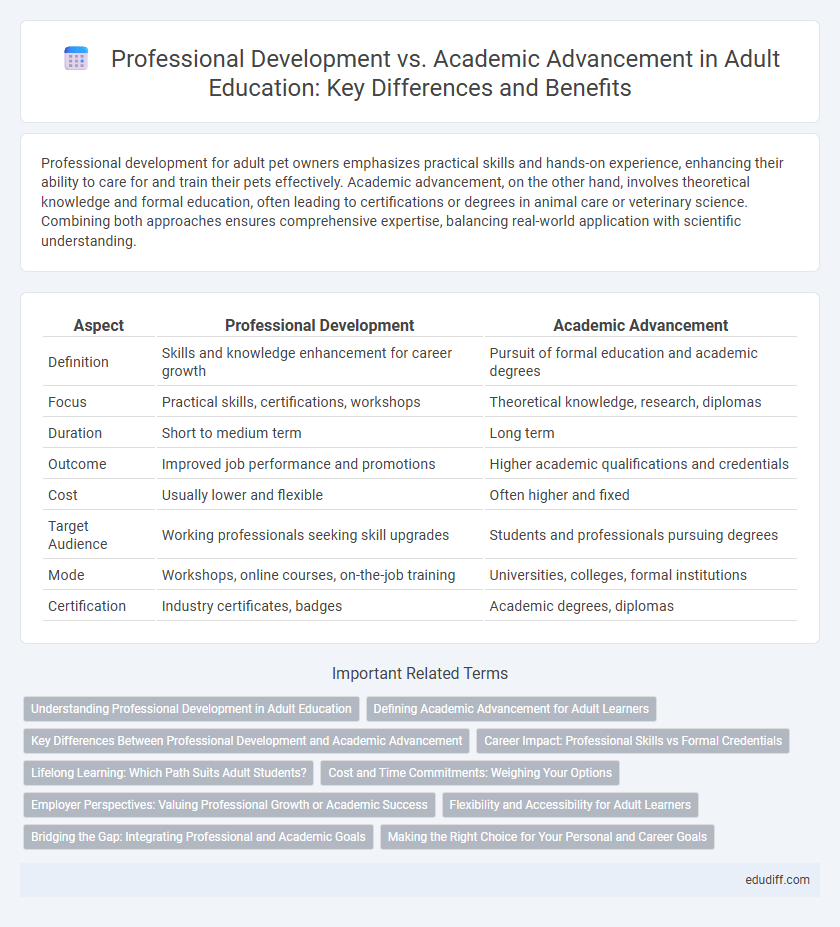Professional development for adult pet owners emphasizes practical skills and hands-on experience, enhancing their ability to care for and train their pets effectively. Academic advancement, on the other hand, involves theoretical knowledge and formal education, often leading to certifications or degrees in animal care or veterinary science. Combining both approaches ensures comprehensive expertise, balancing real-world application with scientific understanding.
Table of Comparison
| Aspect | Professional Development | Academic Advancement |
|---|---|---|
| Definition | Skills and knowledge enhancement for career growth | Pursuit of formal education and academic degrees |
| Focus | Practical skills, certifications, workshops | Theoretical knowledge, research, diplomas |
| Duration | Short to medium term | Long term |
| Outcome | Improved job performance and promotions | Higher academic qualifications and credentials |
| Cost | Usually lower and flexible | Often higher and fixed |
| Target Audience | Working professionals seeking skill upgrades | Students and professionals pursuing degrees |
| Mode | Workshops, online courses, on-the-job training | Universities, colleges, formal institutions |
| Certification | Industry certificates, badges | Academic degrees, diplomas |
Understanding Professional Development in Adult Education
Professional development in adult education emphasizes practical skills and continuous learning tailored to career goals, unlike academic advancement which prioritizes formal degrees and theoretical knowledge. It involves workshops, certifications, and on-the-job training that address current industry demands and workforce trends. Emphasizing experiential learning and real-world application, professional development enhances employability and adaptability in dynamic job markets.
Defining Academic Advancement for Adult Learners
Academic advancement for adult learners encompasses gaining advanced degrees, certifications, or specialized training that enhance theoretical knowledge and critical thinking skills. This progression often requires balancing educational goals with work and personal responsibilities, emphasizing flexible learning formats such as online courses and night classes. Success in academic advancement directly correlates with increased career opportunities and long-term professional growth.
Key Differences Between Professional Development and Academic Advancement
Professional development emphasizes practical skills and workplace competencies tailored to enhance job performance and career growth, while academic advancement focuses on formal education achievements such as degrees and certifications. Professional development often involves workshops, seminars, and on-the-job training, targeting immediate application in professional settings. Academic advancement requires structured curricula, research, and assessments that contribute to long-term knowledge and qualifications.
Career Impact: Professional Skills vs Formal Credentials
Professional development emphasizes acquiring practical skills and competencies directly applicable to workplace challenges, enhancing immediate job performance and adaptability. Academic advancement provides formal credentials and theoretical knowledge that establish credibility and open doors to leadership roles and specialized fields. Balancing professional skills with recognized academic qualifications optimizes career growth and long-term employment opportunities.
Lifelong Learning: Which Path Suits Adult Students?
Lifelong learning for adult students balances professional development and academic advancement, aligning with career goals and personal growth. Professional development offers practical skills and certifications that enhance immediate job performance, while academic advancement provides in-depth knowledge and credentials for long-term career elevation. Choosing the right path depends on an individual's industry demands, time commitment, and career aspirations.
Cost and Time Commitments: Weighing Your Options
Professional development often requires less financial investment and shorter time commitments compared to academic advancement, making it a viable option for adults seeking immediate skill improvement. Academic advancement typically involves higher tuition fees and multi-year enrollment, demanding a significant time and monetary commitment. Evaluating cost-effectiveness and time availability helps learners choose between quick, affordable skill upgrades and long-term, comprehensive education.
Employer Perspectives: Valuing Professional Growth or Academic Success
Employers increasingly prioritize professional development, valuing practical skills, certifications, and hands-on experience that directly impact job performance and adaptability in dynamic work environments. While academic advancement provides theoretical knowledge and foundational expertise, many organizations favor continuous professional learning and applied competencies for career progression and leadership potential. Balancing both credentials can enhance employability, but employer trends often lean toward professional growth as a key indicator of workforce readiness and innovation capacity.
Flexibility and Accessibility for Adult Learners
Flexibility in scheduling and online course availability significantly enhance accessibility for adult learners balancing work, family, and education. Professional development programs often offer modular, on-demand sessions that cater to immediate skill application, while academic advancement typically requires longer commitments with structured semesters. These adaptable learning formats allow adults to pursue career growth and educational goals without sacrificing personal responsibilities.
Bridging the Gap: Integrating Professional and Academic Goals
Bridging the gap between professional development and academic advancement fosters a holistic approach to career growth by aligning practical skills with theoretical knowledge. Integrating continuing education programs with workplace training enhances skill applicability and supports lifelong learning pathways. Collaborative initiatives between employers and educational institutions can create tailored curricula that meet evolving industry demands while promoting academic achievement.
Making the Right Choice for Your Personal and Career Goals
Professional development offers practical skills and industry-specific knowledge that directly enhance job performance and career progression. Academic advancement provides theoretical foundations and advanced credentials that open doors to leadership roles and specialized fields. Aligning your choice with personal aspirations and workplace demands ensures career growth and job satisfaction.
Professional Development vs Academic Advancement Infographic

 edudiff.com
edudiff.com